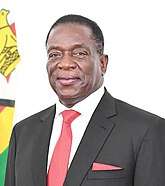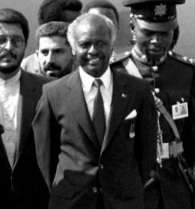President of Zimbabwe
The President of Zimbabwe is the highest office in the executive branch of the country's government. The president is head of state of Zimbabwe, elected by direct universal suffrage using a two-round system. Formerly a ceremonial role, the president is now also the head of government. The president serves a maximum of two five-year terms.
| President of the Republic of Zimbabwe | |
|---|---|
 Presidential Standard | |
| Style | His Excellency (Formal, in international correspondence) Comrade President (Informal) |
| Residence | State House |
| Appointer | popular vote |
| Term length | 5 years, renewable once[1] |
| Inaugural holder | Canaan Banana |
| Formation | 18 April 1980 |
| Deputy | Vice-President of Zimbabwe |
| Salary | US$200,000 (2014)[2] |
| Website | www |
 |
|---|
| This article is part of a series on the politics and government of Zimbabwe |
|
Legislature |
|
Judiciary |
History of the office
The office of the president of Zimbabwe was established in 1980, when the country gained independence from the United Kingdom. Per the Lancaster House Agreement, Zimbabwe was originally a parliamentary republic, with the president serving in mostly a ceremonial role. Real power was vested in the prime minister, Robert Mugabe.
A Methodist minister, Canaan Banana, became the first president, serving until 1987. He resigned in 1987 shortly after the Constitution was amended to make the presidency an executive post, and the office of Prime Minister was abolished. Mugabe was appointed to succeed him, and was elected in his own right in 1990 and four more times thereafter.
The office of Prime Minister was restored as a result of the 2008–09 political negotiations, but abolished again following the 2013 constitutional referendum. Under the rules adopted by the same referendum, the president serves a maximum of two five-year terms.[1] This did not have a retroactive effect on past terms of office already served or currently being served as of 2013.[3]
2017 coup d'état
On 14 November 2017, armed military personnel from the Zimbabwe Defence Forces invaded the Zimbabwe Broadcasting Corporation studios in Harare before Major General Sibusiso Moyo came out on a live television broadcast declaring that the army had activated an operation that would later be known as "Operation Restore Legacy." Moyo stated that President Mugabe and his family would be safe and their security would be guaranteed, as the operation was only targeting criminals around him. What followed thereafter was a well-planned and carefully executed crackdown on members of a faction within the ruling ZANU-PF party known as G40. The Zimbabwe Republic Police and the Central Intelligence Organisation, both deemed loyal to the president, were neutralised by the army, which arrested some of their top leaders.
On 21 November 2017, facing all-but certain impeachment from a combined session of the House of Assembly and Senate, Mugabe resigned as president. Former vice president Emmerson Mnangagwa was sworn in as his replacement on 24 November 2017.
Presidents of Zimbabwe (1980–present)
| No. | President | Took office | Left office | Time in office | Party | Election | |
|---|---|---|---|---|---|---|---|
| 1 | Canaan Banana (1936–2003) | 18 April 1980 | 31 December 1987 | 7 years, 257 days | ZANU | 1980 1986 | |
| 2 | Robert Mugabe (1924–2019) | 31 December 1987 | 21 November 2017 | 29 years, 325 days | ZANU–PF | 1990 1996 2002 2008 2013 | |
| 3 | Emmerson Mnangagwa (born 1942) | 24 November 2017 | Incumbent | 2 years, 268 days | ZANU–PF | 2018 |
Phelekezela Mphoko was the second (and only sitting) vice-president at the time of Mugabe's resignation on 21 November 2017. Mphoko may have been acting president of Zimbabwe for three days until Mnangagwa's accession to the presidency. However, as Mphoko was not in the country at the time, and due to the unusual circumstances, any official standing on this is unclear and may never be known.[4][5][6][7]
Rank by time in office
| Rank | President | Time in office |
|---|---|---|
| 1 | Robert Mugabe | 29 years, 325 days |
| 2 | Canaan Banana | 7 years, 257 days |
| 3 | Emmerson Mnangagwa | 2 years, 268 days |
Latest election
Living former heads of state
Following the death of Robert Mugabe on 6 September 2019 there are currently no living former presidents of Zimbabwe.
See also
- Prime Minister of Zimbabwe
- Vice President of Zimbabwe
- President of Rhodesia
- President of Zimbabwe Rhodesia
References
- "Zimbabweans hope for democratic rebirth". BBC News. 20 March 2013. Retrieved 15 August 2013.
- Gumbo, Lloyd (22 April 2014). "President reveals monthly salary". The Herald. Retrieved 22 April 2014.
- Allison, Simon (26 March 2013). "Even Zimbabwe's constitution waits for Mugabe to pass the baton, or pass away". theguardian.com. The Guardian. Retrieved 21 November 2017.
- "Mphoko is the Acting President for now". Bulawayo 24. 22 November 2017.
- "Experts clear the air on succession". The Herald. 22 November 2017.
- "Zimbabwe has 'phantom-like' acting president". News 24. 23 November 2017.
- "Where is Mphoko, legally the acting President?". The Zimbabwe Mail. 22 November 2017.


.jpg)
.jpg)